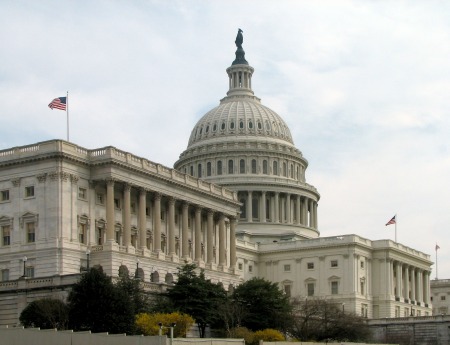FCC Seeks Hill Authority to Add Edge to USF Subsidies
Does not say just how it would use that authority, which could include assessing ISPs, but wants flexibility

The smarter way to stay on top of the streaming and OTT industry. Sign up below.
You are now subscribed
Your newsletter sign-up was successful
Don't look for the FCC to expand its Universal Service Fund broadband subsidy contribution base to cable broadband providers or edge providers including streamers like Netflix and Amazon, as well as digital advertising companies unless Congress gives it clear authority. But if it does, watch out.
The FCC sought comments on the future of a subsidy that is based on contributions from dwindling traditional telecom (phone) service, and a number of stakeholders argued it already has the authority to expand contributions to broadband access and to streamers and other edge providers users of bandwidth and should do so ASAP.
In a report to Congress on the state of the Universal Service Fund (USF) that drew from those comments, the FCC said Monday (Aug. 15) that if it did decide to include streamers and other edge providers, including digital ad companies, in the contribution base, it could be a lengthy process without some help from the Hill, but the FCC says that authority is not clear.
Also: Edge Provider to FCC: Add ISPs, Not Us, to USF Contribution Base
"The Commission has never analyzed its authority to regulate edge providers, which broadly defined, encompass a wide variety of different entities that provide Internet content, applications, and services," the FCC told Congress. "Before the Commission could require contributions under its permissive authority for any type of edge provider, it would need to conduct a rulemaking proceeding and establish a record that analyzed and applied the definition of 'telecommunications'” to edge providers and demonstrated that the public interest supports requiring contributions."
As for making cable and telecom broadband providers pay into the subsidy, costs that are passed on to subscribers, the report suggested that could be problematic due to its potential for working against the Administration's goal, in creating the subsidy, of making broadband more affordable, but did not rule it out, again, if Congress stepped in to clarify its authority to do so.
"We recommend that in considering changes to the contributions base, the Commission should....take efforts to avoid raising the cost of broadband service and shifting the financial burden from corporations to consumers at a point in time when the federal government is working to address affordability challenges contributing to the digital divide."
The smarter way to stay on top of the streaming and OTT industry. Sign up below.
In the section on possible Congressional action, the FCC said that its review found there to be "significant ambiguity" over whether it could expand the contribution base, then asked that Congress give it such authority.
"We recommend Congress provide the Commission with the legislative tools needed to make changes to the contributions methodology and base in order to reduce the financial burden on consumers, to provide additional certainty for entities that will be required to make contributions, and to sustain the Fund and its programs over the long term."
Some argue the fund will not be as crucial as in the past given that the Biden Administration has poured tens of billions of infrastructure bill money and COVID-19 relief money in to broadband buildouts, adoption and affordability.
USTelecom was happy to hear the FCC's call for legislative clarity.
"Today, the vast majority of Internet traffic comes from a handful of dominant edge companies that do not contribute to the fund," said USTelecom president Jonathan Spalter. "We applaud the Commission’s clear recommendation that Congress ensure the FCC has the authority to expand the contributions base to include dominant edge providers. At the same time, we encourage the Commission to move forward within its existing permissive authority to secure the future for universal service.”
Commissioner Brendan Carr said he was happy the report raised issues with assessing ISPs and the impact on broadband affordability, and was happy that the report did not have similar issues with potentially adding edge providers, of which Carr has been very critical.
He said Congress would probably have to give the FCC added authority to go after edge provider pocketbooks, so he supported asking Congress for the needed tools to do that, adding: "I also want to encourage all stakeholders that are interested in the long-term sustainability of the USF and its invaluable programs to echo this call for Congress to grant the Commission additional authority."
Commissioner Nathan Simington associated himself with Carr's remarks, both adding edge providers tot he contribution base and not doing so for ISPs.
"I agree with Commissioner Carr's sentiments," he said, "particularly his emphasis on relating funding for connectivity spending to the network effects enjoyed by companies that depend on universal connectivity [edge providers, digital ad services companies]—network effects far larger and more scalable than last-mile charges made by home internet service providers."
The FCC rulemaking process could definitely take a long time, but congressional action is also a long game as well. Congress is currently on recess, then will be focusing on getting itself re-elected in the midterms. And given how hard edge providers have pushed back on privacy legislation, including flooding the Washington media with ads saying the bill could kill the internet golden goose, legislation making them pay into broadband subsidies would likely face similar pushback. ■
Contributing editor John Eggerton has been an editor and/or writer on media regulation, legislation and policy for over four decades, including covering the FCC, FTC, Congress, the major media trade associations, and the federal courts. In addition to Multichannel News and Broadcasting + Cable, his work has appeared in Radio World, TV Technology, TV Fax, This Week in Consumer Electronics, Variety and the Encyclopedia Britannica.

